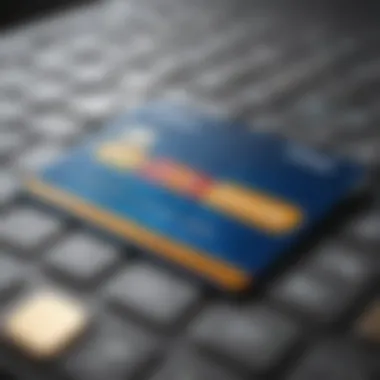Unlimited Visa Card Numbers: Uses and Ethical Implications


Intro
The discussion surrounding unlimited Visa card numbers unveils a territory fraught with financial intricacies and technological advancements. As consumers and businesses alike navigate an increasingly complicated financial landscape, understanding the implications of such card numbers becomes imperative. This article aims to provide keen insights into the nature of unlimited Visa card numbers and how they alter the paradigm of traditional banking and transaction security.
Understanding Loans
The connection between unlimited Visa card numbers and robust financial tools such as loans is crucial. Acquiring knowledge in loans enables users to weigh the pros and cons of their financial options. Within this section, we will dissect several facets of loans that are intertwined with the subject at hand.
Types of loans
Loans exist in various forms. Personal loans can fund diverse needs, such as emergencies or life events. Student loans help individuals manage education expenses. Each type has its own dynamics, targeting specific financial requirements.
Loan eligibility criteria
Qualifying for a loan generally involves assessing income, employment stability, and credit score. Understanding this can illuminate whether a user could manage debt alongside an unlimited Visa card.
Pros and cons of taking out a loan
Borrowing offers the potential to expedite financial goals. However, impetuous decisions can lead to overwhelming debt. Factors to ponder include:
- Interest rates
- Duration of repayment
- Impact on credit score
Mortgage Essentials
Mortgage loans are a common necessity for homebuyers. Knowing different aspects aids in making informed choices. Here's a brief overview.
Overview of types of mortgages
Fixed-rate mortgages maintain consistent payments across terms. In contrast, adjustable-rate mortgages can fluctuate over time, altering monthly budgets.
Mortgage application process
Applying for a mortgage entails gathering necessary documentation: proof of income, credit history, and more. This process can be time-consuming yet forms the foundation for homebuying.
Home affordability calculations
A critical assessment here involves examining one’s financial health against mortgage prices. Factors include:
- Debt-to-income ratio
- Current expenses and savings
Refinancing Insights
Refinancing often puzzles individuals. Yet it can yield financial benefits when advised correctly.
Reasons to refinance a loan
Motivations behind refinancing may stem from lower interest rates or improved finances. Evaluating current terms can lead to substantial savings.
Steps involved in refinancing
- Assess existing loan terms
- Research refinancing lenders
- Submit the necessary documentation
- Understand potential fees
How to determine if refinancing is right for you
Each financial situation is unique. Therefore, alignment with goals such as reducing payments or consolidating debt should be paramount.
Navigating Credit Cards
Given the theme, engagement with credit cards remains significant. Key ideas can help users better manage their financial endeavors.
Types of credit cards
Cards can range from cashback ones, rewarding daily spending, to travel cards, which offer benefits during trips. Proper selection influences financial outcomes.
Credit card utilization tips


Keeping utilization below 30% aids in maintaining a healthy credit score. Developing smart spending habits fosters financial stability.
Avoiding common credit card pitfalls
Some common issues include accruing debt above means or ignoring payment deadlines. Such habits can wreak havoc on personal finances.
Protecting with Insurance
Though insurance may seem adjacent, its importance cannot be ignored in overall financial health. Multiple types secure assets against losses.
Importance of different insurance types
Health and auto insurance, among others, cushion unexpected expenses. Financial planning should always incorporate coverage strategies.
Shopping for insurance policies
Price shopping with various providers can reveal differences. Awareness fosters informed choices in personal coverage needs.
Understanding insurance premiums and deductibles
In combination, these factors affect how much individuals might pay out-of-pocket versus monthly obligations.
Financial acumen, especially in cards and loans, becomes vital in avoiding hazards and striding toward stability.
With this contextual understanding in play, we will explore unlimited Visa card numbers deeper in subsequent sections.
Prolusion to Unlimited Visa Card Numbers
Understanding the concept of unlimited Visa card numbers is increasingly pertinent in today’s digital landscape. As online transactions surge, consumers seek more flexible purchasing tools. Unlimited Visa card numbers represent a forward-thinking approach to financial management, offering a range of potential benefits while also posing certain considerations. Here, we will explore the depth of this topic, providing readers with crucial insights into its implications and use.
Definition of Unlimited Visa Card Numbers
Unlimited Visa card numbers can be defined as a unique set of digits generated for transaction purposes, possessing the potential for unlimited validity and, essentially, unlimited spending capabilities. Unlike traditional credit or debit card numbers, which often have restrictions tied to accounts or card limits, these numbers provide a different framework.
This concept addresses a variety of needs. For example, consumers engaged in frequent online shopping may find these numbers particularly beneficial, as they streamline purchases across multiple platforms without the hassle of repeatedly entering lengthy card information.
Furthermore, the ability to generate these numbers can enhance security by reducing exposure to personal account details during transactions.
Historical Context of Visa Card Number Generation
The generation of Visa card numbers has evolved over decades. Initially, card numbers were strictly linked to physical cards, exerting significant limitations in a rapidly digitizing world. As technological innovations emerged, digital transactions increased. Thus, this demand for greater efficiency shaped the evolutionary course of Visa card offerings.
Historically, the first steps toward generating card numbers outside of conventional limits emerged with online transactions gaining popularity in the late 1990s and early 2000s. This marked the beginning of safer electronic commerce practices, bringing forth virtual cards and, ultimately, unlimited Visa card numbers.
Today, as a curation of multiple electronic payment methods materializes, the context of Visa card numbers embodies necessity and advancement in financial ideation on a global scale. Consumers can now effortlessly complete transactions, while businesses address the complex networking of card issuers, gaining insights directly from transaction data without infringing security measures.
How Unlimited Visa Card Numbers Work
Understanding how unlimited Visa card numbers function is crucial for grasping their broader applications and implications in the realm of finance. This section delves into two key aspects: the generation of Visa card numbers and the technical mechanisms that support unlimited Visa cards. Knowledge in these areas informs users about the potential benefits and underlying risks while fostering a nuanced understanding of their workings.
Generation of Visa Card Numbers
The generation of Visa card numbers occurs primarily through complex algorithms developed by payment networks. These algorithms ensure that each card number is unique and adheres to specific formatting rules established by the ISO/IEC 7812 standards.
A legitimate Visa card number is 16 digits long and begins with a '4'. The card numbers are composed of the following parts:
- Issuer Identification Number (IIN): The first six digits identify the institution that issued the card.
- Account number: The following nine digits represent the personal account, which is unique to the cardholder.
- Check digit: The last digit is a checksum, ensuring the number’s validity.
For unlimited Visa card numbers, special systems in some financial institutions may utilize advanced arithmetic within these structural features to create additional, seemingly infinite, variations without falling into duplicity. This serves not only to protect sensitive data but also facilitate trials in particular banking protocols desired by merchants or users engaged in specific transactions.
Technical Mechanisms Behind Unlimited Visa Cards
Unlimited Visa cards are backed by sophisticated technology built on secure transaction processing networks such as VisaNet. This ecosystem makes the various associated technical mechanisms within the generation of card numbers pivotal in enhancing user experience and security.
Among the important features are:


- Fraud Prevention: Cutting-edge software tools actively prevent unauthorized access and fraudulent transactions by using intricate algorithms and machine learning to analyze transaction patterns.
- Tokenization: This mechanism replaces sensitive information with randomly generated numbers or tokens, effective even for transactions lacking physical cards.
- Encryption Protocols: Data transmitted over networks are encrypted to ensure secure exchanges between card issuers and merchants, protecting user information from potential threats.
These mechanisms work together to mitigate risks related to fraud and identity theft, offering a secure framework for individuals generating and using unlimited Visa cards within the mostly online transactions.
Utilizing a comprehensive understanding of these technical functions empowers users to make informed financial decisions in this evolving digital landscape.
Overall, the workings of unlimited Visa card numbers embed intricate yet critical factors impacting the daily financial transactions undertaken by consumers in varying contexts.
Applications of Unlimited Visa Card Numbers
Understanding the applications of unlimited Visa card numbers is crucial in grasping their viability in today’s digital economy. The potential for increasing the efficiency and versatility of financial transactions cannot be underestimated. As online commerce continues to grow rapidly, so do the operational frameworks supporting various payment methods. Here, we explore specific elements shedding light on their benefits and considerations.
Common Use Cases in Online Transactions
Unlimited Visa card numbers serve different purposes in online transactions. They can function as a buffer against fraud due to their ephemeral nature. Users can generate temporary card numbers connecting to their primary accounts for ad-hoc purchases. This prevents cybercriminals from accessing sensitive information directly linked to the primary card. Hence, it minimizes the risk of charge-backs and potential identity theft.
Additionally, users may leverage these card numbers for effective expense tracking. For instance, allocating different card numbers for specific subscriptions assists in budgeting and controlling expenditures effectively. Instead of dealing with one general card that encompasses all transactions, users who implement multiple card numbers can have a clearer picture of their financial habits.
Furthermore, the complication of secure online transactions is increasingly bypassed. Unlimited Visa card numbers empower transactions for individuals dealing with vendors who do not have robust security protocols in place. By using disposable card numbers, users can replace their physical cards in the payment pipeline, reducing their exposure to long-term vulnerabilities.
Role of Unlimited Visa Cards in E-commerce
Within the e-commerce landscape, unlimited Visa card numbers integrate seamlessly into a customer-oriented approach. The rise of platforms that accept multiple types of payment means merchants often seek additional features that attract consumers.
E-commerce providers adopting unlimited Visa card usage provide higher levels of flexibility and enhancement of user experiences. This can lead to increased sales, as consumers feel assured that their financial data remains protected.
Moreover, marketing strategies evolve, benefiting from the capability to target customers who desire greater security in their purchases. As competition intensifies in the digital marketplace, card number flexibility translates into text-centric security frameworks. Notably, unlimited Visa cards can set an indirect reputational benchmark, attracting those who value confidentiality in their transaction processes.
Risks Associated with Unlimited Visa Card Numbers
The advent of unlimited Visa card numbers offers many possibilities. However, with these opportunities, significant risks come into play as well. Understanding these risks is essential for anyone considering using these cards. Awareness leads to better management of finances and routines. When mishandled, unlimited Visa card numbers can create vulnerabilities that can be exploited.
Fraud and Identity Theft Concerns
Fraud and identity theft represent two of the primary risks linked with unlimited Visa card numbers. Criminals often look for weaknesses in electronic payments systems. With sufficient personal data, they can remotely access financial resources. Given this potential for misuse, it is crucial for individuals to practice vigilance.
Some factors that increase the risk include:
- Phishing attacks: Fraudsters may trick users into revealing personal information through emails or deceptive websites.
- Data breaches: Large-scale breaches of financial institutions can expose personal data. Thieves can use these leaks to create unlimited Visa card numbers in someone else's name.
- Weak passwords: A lack of standard secure password practices leave accounts open to be hacked easily.
This presents a pivotal issue. It underscores the urgency of implementing robust security measures to minimize exposure. For buyers, understanding how these factors potentially threaten their security can inform their usage of these cards.
Security Challenges in Digital Transactions
With the rise of unlimited Visa card numbers, digital transaction security has come to the forefront of financial discussions. Subjects undertake transactions either through websites or mobile apps. However, both platforms are susceptible to various security challenges.
These challenges can include:
- Encryption vulnerabilities: Inadequate or outdated encryption technology leaves data susceptible. This creates chances for unauthorized access to sensitive user data.
- Man-in-the-middle attacks: Malicious actors can intercept communication between the user and platform often without detection. This compromises personal information.
- Insecure networks: Relying on public Wi-Fi for financial transactions poses severe risks. Such connections are more easily exploited by hackers.
To sum up, staying aware of prevalent security challenges may play crucial part in real-world usage of unlimited Visa card numbers. Developing strategies can forge efficient pathways to improve security when carrying out transactions online.
Legal Implications of Using Unlimited Visa Card Numbers
Understanding the legal implications of using unlimited Visa card numbers is crucial for users, merchants, and regulatory bodies alike. These considerations pertain not only to compliance with current legislation but also reflect the potential ethical concerns surrounding misuse and fraud. The ramifications could be far-reaching, affecting financial integrity and consumer trust in the broader e-commerce ecosystem. As digital transactions become commonplace, awareness about appropriate usage within the legal ambit is even more imperative.
Regulatory Framework Governing Card Usage
The regulatory framework governing card usage varies by jurisdiction but generally includes guidelines from both national and international bodies. In the United States, entities like the Consumer Financial Protection Bureau and the Federal Trade Commission create rules to protect consumers engaging in credit transactions. These regulations help prevent fraud and protect user information.
Repeatedly, countries enforce compliance with global standards like the Payment Card Industry Data Security Standard (PCI DSS). This standard aims to ensure that businesses maintain a secure environment for processing sensitive card information. Any unauthorized generation of unlimited Visa card numbers would not only breach these standards, but potentially incur legal consequences for businesses feailing to comply.
Key aspects of this regulatory framework also address:
- The prevention of money laundering: Laws like the Bank Secrecy Act (BSA) oblige card issuers and financial institutions to monitor transactions.
- User privacy protections: Legislation such as the General Data Protection Regulation (GDPR) dictates stringent data handling methods, regarding personal information processed during transactions.
- Anti-fraud measures: Mandates exist that require regular audits and transactional monitoring as a means to prevent unauthorized use of cards and to audit possible breaches aided by unlimited card numbers.


Revised regulations could integrate emerging threats each year based on expert assessments from financial and cybersecurity professionals.
Compliance Issues and User Responsibilities
Navigating compliance issues is vital within the framework concerning unlimited Visa card numbers. Users must be aware of their responsibilities; failure to comprehend this can lead to serious legal trouble. Meeting compliance standards involves understanding how to use card numbers within authorized contexts.
Everyone using unlimited variations need to consider the following:
- Verify legitimacy: Evaluate the legitimacy of transfer methods. Users should avoid entering card information in untrusted platforms or sharing them in unsecured environments.
- Safeguard information: It becomes imperative to enhance digital hygiene. Users should apply basic protective measures, like using recognized security software, maintaining updated passwords, and utilizing two-factor authentication options.
- Report suspicious activity promptly: Misdirected transactions or unauthorized access should be reported. Being proactive could mitigate losses before they spiral out of control. Card issuers will have protocols in place for such occurrences which users must follow.
"A strong compliance culture reinforces trust between users and financial institutions, encouraging proper usage of unimited card numbers while safeguarding against fraud."
Tracking compliance becomes heavily data-driven, as technological advancements in machine learning and artificial intelligence are employed to identify abnormal behavior, thereby upholding user responsibilities. Proper measures can maximize security, promote ethical compliance concerning unlimited Visa card numbers, and gradually increase offensive checks against misuse involving unlimited card numbers.
Alternatives to Unlimited Visa Card Numbers
Alternatives to unlimited Visa card numbers merit a focused examination due to the rapid evolution of financial technology and consumer need for flexibility and security. Alternatives provide various solutions that can address fiscal objectives without unsupported vulnerabilities. Thus, exploring options like prepaid cards and virtual cards comes into play.
Prepaid Cards as Viable Options
Prepaid cards are an attractive alternative for users who prefer to limit their spending. These cards can be loaded with a specific amount of money, which helps to control expenses. Users cannot spend more than what they have preloaded, thus minimizing potential debt. This makes prepaid cards suitable for budgeting purposes.
Such systems often require less stringent eligibility criteria than traditional credit cards. The absence of credit checks allows broader access for consumers. Users can purchase prepaid cards from retail stores, online platforms, or banks, providing convenience in accessing and managing finances.
Despite their benefits, prepaid cards are not without downsides. They may come with hidden fees, such as for reloading or maintenance. Therefore, careful scrutiny of the terms of service for each issuer becomes necessary. Understanding these aspects empowers consumers to maximize their benefits without incurring excessive charges.
Virtual Cards and Their Advantages
Virtual cards present another attractive option for consumers one desire a further layer of security in their transactions. Unlike traditional models, virtual cards do not possess a physical form. Instead, users are assigned unique card numbers to conduct online transactions. This can effectively reduce the risks associated with exposing primary account numbers.
The advantages of virtual cards extend beyond mere security. They offer temporary or disposable card numbers. Instead of providing a single number that can be linked to identity theft or fraud, users can create a temporary number for particular purchases. This enables more control over personal information, reducing the potential for fraud.
Additionally, typical features include integration with digital wallets and contactless payment systems. Users can utilize virtual cards within their favorite apps securely, providing an efficient avenue for financial transactions.
Understanding these alternatives provides consumers essential choice in a dynamic environment. Weighing options such as prepaid or virtual cards against unlimited Visa card numbers allows for better-informed financial decisions. Each individual must determine what blend of flexibility, security, and manageability serves their particular situations best.
Best Practices for Managing Unlimited Visa Card Numbers
Managing unlimited Visa card numbers is crucial for maintaining financial security and optimizing their usage. Understanding best practices helps users mitigate risks, enhance transaction efficiency, and ensure compliance with any existing regulations. Here are essential strategies individuals should consider when handling these financial tools.
Strategies for Secure Usage
Security is paramount when using unlimited Visa card numbers. Here are some strategies to reinforce safety:
- Use Strong Passwords: Always create complex passwords that combine letters, numbers, and symbols. Avoid common words or easily guessable details like birthdates.
- On Secure Websites Only: Use unlimited Visa cards on secure websites. This is confirmed by the presence of https in the URL, alongside a padlock icon.
- Enable Two-Factor Authentication: Whenever possible, activate two-factor authentication on your accounts associated with your Visa card. This offers an added layer of protection.
- Regularly Update Card Information: Periodically change your card’s details to prevent unauthorized access.
- Limit Card Use: Use these cards stimulatively only for necessary transactions, which reduces exposure to risks.
By adhering to these strategies, users can encourage more secure environments for financial activities.
Monitoring Transactions Effectively
Monitoring transactions on unlimited Visa cards is not just about protecting finances; it's also about understanding spending behavior. Here are ways to monitor effectively:
- Utilize Banking Apps: Many banks provide dedicated apps that allow live tracking of expenditure. These applications help users maintain oversight and receive alerts for suspicious transactions.
- Set Up Alerts: Set up transaction alerts to be notified of all activities related to your card. Often users can specify limits that trigger notifications.
- Review Statements Regularly: Consistently review monthly statements for any irregularities or unexpected charges. This provides insight into spending patterns, which is beneficial for budgeting.
- Keep a Record: Maintain a log of your transactions, which enables you to verify each entry quickly against your bank statement.
By implementing these monitoring practices, cardholders can not only safeguard their accounts but also gain a clearer view of their finances, making informed decisions in everyday spending.
Effective management of unlimited Visa card numbers is essential for a secure personal financial strategy, blending both technology and disciplined usage to optimize outcomes.
Epilogue and Future Considerations
The discussion around unlimited Visa card numbers highlights their significance in modern financial transactions. As technology evolves, the way we perceive and utilize credit has undergone substantial shifts. Understanding these dynamics is crucial because it defines how we interpret security risks, usability, and market adaptability.
Summary of Key Points
In summarizing the key points discussed in this article, several aspects stand out.
- Definition and Function: Unlimited Visa card numbers represent a shift toward increasing flexibility in digital transactions.
- Practical Applications: They serve various online platforms, with usage extending from e-commerce to everyday purchases.
- Risks and Challenges: Concerns related to fraud and identity theft persist, necessitating observation and implementation of security measures.
- Legal Aspects: Being aware of the regulatory frameworks and compliance issues remains vital for users.
- Management Practices: Best practices in security and transaction monitoring are essential for safeguarding oneself against potential threats.
Predictions for the Future of Unlimited Visa Numbers
As we look ahead, a few predictions emerge regarding unlimited Visa card numbers.
- Increased Popularity: As consumers seek efficient means of payment, unlimited Visa cards may become even more widely accepted by businesses.
- Technological Integration: Innovations, such as the use of biometric verification and machine learning for fraud detection, may enhance security measures tied to these card numbers.
- Regulatory Changes: We could see new regulations enacted focusing on consumer protection related to unlimited use. Not all companies will adapt uniformly, creating possible disparities in accountabilities.
- Emerging Trends: The ongoing shift toward virtual and cryptocurrency transactions may impact how unlimited Visa numbers eventually integrate into blockchain technology, redefining their functional scope in the future.







